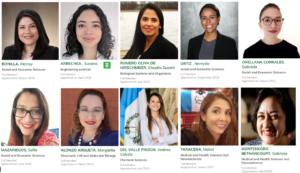Library websites as facilitators of research
Kim Pyle recently completed an 8 week internship at INASP assessing library websites of African Universities.
Global development is a huge topic. And for a recent graduate wanting to get involved, it’s also a very daunting one. So many organisations working in so many different areas – how do you decide where to put your time and energy to make the most difference? When I came across INASP and the work that it does supporting development through research communication, I thought I had managed to narrow the field. However, after eight weeks as an INASP intern, I can definitely say that my view of development has broadened rather than narrowed.
My internship has been with the Library Development team, working on a project assessing the library websites of African Universities. A previous study has shown that despite great improvements in the availability of e-resources, uptake and usage have remained disappointingly low (see Growing knowledge: access to research in east and southern African universities). We wanted to see if one of the reasons for this could be the way e-resources are presented and promoted, and the ease with which they can be accessed (or not) through the library website. Despite my background as a science student, with plenty of experience of the pitfalls and frustrations of searching for literature online, I had never fully considered the huge potential of library websites as facilitators of research.
The results of the work have been varied, with a fairly encouraging number of resources available, but a disappointing lack of user-friendliness when it comes to access. The view I got was also one of extremes – several large, established institutions with excellent online facilities, but many smaller, newer libraries with little online presence.
Of course, a lot of this isn’t really surprising. There are a lot of things that you need to have in place before getting to a comprehensive, user-focused library website that answers researchers’ needs. There are problems with bandwidth, ICT expertise, library capacity, and funding. But the potential for library websites to provide access to and increase awareness of e-resources is huge, and that in turn has a great impact on new research being produced, and so the research communication cycle rumbles on.
So global development is a huge topic, and this summer I have learnt that even the [slightly] narrowed field of supporting development though research communication is also pretty vast in its scope, and in the amount of work being done. Fortunately, the brilliant people at INASP that I’ve worked with this summer have made me feel that this is much more of an exciting prospect than a daunting one.
The preliminary results of this work were presented by Peter Burnett at the Africa Section of the 2012 IFLA conference in Helsinki earlier this month, and a full report will be available soon.





Kim,
I share your passion for the possibility of disseminating information and believe that it should be easily accessible – and easy to navigate. I recently developed a portal for Drugs and Alcohol Open Access Resources and have been gathering feedback for the last several months. It’s designed for users in developing nations and users have found the search engines very easy to use. Take a look at it when you have time. Good luck in your endeavors.
http://guides.library.vcu.edu/drugs-alcohol
Nita,
Thanks for your comment, I agree with you completely – there’s so much potential for increasing the uptake and usage of important information like this by making it easier to find and access! I’ve had a look at your Drugs and Alcohol Resources portal, and I was really impressed. One of the things that came up a lot when I was looking at the library websites was how much access can be opened up by having federated search tools and subject/material divisions to guide users. I think that the way those things have been built into your site are fantastic! Let’s hope it really does help to connect people with the information they’re looking for, best of luck with your work on it.